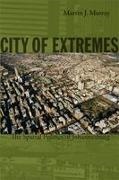En savoir plus
Informationen zum Autor Martin J. Murray is Professor of Urban Planning at the Taubman College of Architecture and Urban Planning, and Adjunct Professor at the Center for African and African-American Studies at the University of Michigan. He is the author of many books, including Taming the Disorderly City: The Spatial Landscape of Johannesburg after Apartheid and Revolution Deferred: The Painful Birth of Post-Apartheid South Africa. Klappentext City of Extremes is a powerful critique of urban development in greater Johannesburg since the end of apartheid in 1994. Martin J. Murray describes how a loose alliance of city builders-including real estate developers, large-scale property owners, municipal officials, and security specialists-has sought to remake Johannesburg in the upbeat image of a world-class city. By creating new sites of sequestered luxury catering to the comfort, safety, and security of affluent urban residents, they have produced a new spatial dynamic of social exclusion, effectively barricading the mostly black urban poor from full participation in the mainstream of urban life. This partitioning of the cityscape is enabled by an urban planning environment of limited regulation or intervention into the prerogatives of real estate capital. Combining insights from urban studies, cultural geography, and urban sociology with extensive research in South Africa, Murray reflects on the implications of Johannesburg’s dual character as a city of fortified enclaves that proudly displays the ostentatious symbols of global integration and the celebrated “enterprise culture” of neoliberal design, and as the “miasmal city” composed of residual, peripheral, and stigmatized zones characterized by signs of a new kind of marginality. He suggests that the “global cities” paradigm is inadequate to understanding the historical specificity of cities in the Global South, including the colonial mining town turned postcolonial megacity of Johannesburg. Zusammenfassung A powerful critique of urban development in greater Johannesburg since the end of apartheid in 1994. Inhaltsverzeichnis List of Maps vii List of Illustrations ix Preface xi Acknowledgments xxvii Abbreviations xxxi Introduction. Spatial Politics in the Precarious City 1 Part I 23 Making Space: City Building and the Production of the Built Enivronment 1. The Restless Urban Landscape: The Evolving Spatial Geography of Johannesburg 29 2. The Flawed Promise of the High-Modernist City: City Building at the Apex of Apartheid Rule 59 Part II 83 Unraveling Space: Centrifugal Urbanism and the Convulsive City 3. Hollowing out the Center: Johannesburg Turned Inside Out 87 4. Worlds Apart: The Johannesburg Inner City and the Making of the Outcast Ghetto 137 5. The Splintering Metropolis: Laissez-faire Urbanism and Unfettered Suburban Sprawl 173 Part III 205 Fortifying Space: Siege Architecture and Anxious Urbanism 6. Defensive Urbanism after Apartheid: Spatial Partitioning and the New Fortification Aesthetic 213 7. Entrepreneurial Urbanism and the Private City 245 8. Reconciling Arcadia and Utopia: Gated Residential Estates at the Metropolitan Edge 283 Epilogue. Putting Johannesburg in Its Place: The Ordinary City 321 Appendix 333 Notes 337 Bibliography 423 Index 463...

